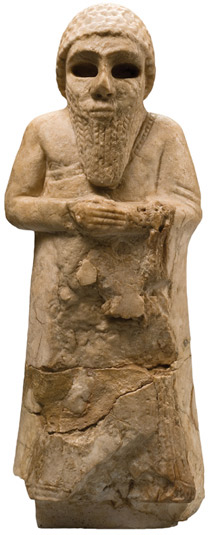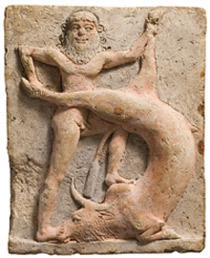
Statuette of a worshipper Umma Mesopotamia (Djoha) |
|
ROYAL MUSEUMS OF ART AND HISTORY
Parc du Cinquantenaire 10
B-1000 BRUSSELS
INFORMATION:
Tél. +32 (0)2 741 72 11 Site : www.mrah.be
Guided tours : Tél +32 (0)2 741 72 14 Email : ecd@kmkg.be
OPENING HOURS:
Tuesdays – Sundays, from 10 a.m. to 5 p.m (the ticket office closes at 4 p.m.)
‘Nocturnes’ till 10 p.m every last Thursday of the month, except during December – thus on January 31, February 28, March 27 and April 24.
Closed on Mondays, December 25 and January 1
ENTRANCE FEES:
7 €, 5,50 € and 3 € ( in particular for school groups and teenagers from 13 to 18 ).
Free for children younger than 13.
PRESS CONTACT:
Bart Suys Tél. +32 (0)2 741 73 00
Email : b.suys@kmkg.be
The exhibition From Gilgamesh to Zénobia offers an exceptional opportunity to underline the importance of the Near East and of Iran in the development of Western culture. Furthermore, visitors will be lucky to see once again the famous collection the Musée royaux d'Art et d'Histoire has of antiques of those regions, and which was closed to the public for a long time while the rooms were being renovated.

|
The famous bronzes from Luristan
The pieces have been- for a great majority - chosen according to their aesthetic qualities, and a few masterpieces from the Louvre complete the ensemble. The objects shown prove how our civilization is indebted to the ancient cultures that so contributed to the development of writing, that largely participated to the evolution of accounting management, that re-launched economy, case-law and sciences, not to mention literature and religious and moral concepts. While the bronzes from Luristan (Iran) are among the masterpieces of the collections of the Musées royaux d'Art et d'Histoire and thus form an ensemble that is unique in the world, they do not take away from the remarkable cylinder seals, from the many proofs of writing and certainly not from the famous votive plaque which undoubtedly shows the Mesopotamian hero from the 4th century B.C., Gilgamesh, following his victory over the celestial bull.
Assyrian reliefs, Sassanid silver …
The selection of pieces presented covers a period that goes all the way to the Roman conquests. The closing point of this large historical survey is the arrest of Queen Zenobia of Palmyra by Emperor Marcus Aurelius, in 272 A.D. The exhibition is made up of various sections. In «A l'ombre de Babel»-In the shade of Babel- (Iraq), one discovers Sumerian sculptures, reliefs from Assyrian palaces, metal figurines, cuneiform texts (of which one on the restoration of the Tower of Babel) and the cylinder seals previously mentioned. The section «La Perse: du village à l'empire» -Persia: from village to Empire-- (Iran) brings together ceramics and metal recipients, richly decorated and in surprising shapes, bronze weapons and armour, silver pieces from the Sassanid period, monumental reliefs and inscriptions of ziggurats and of palaces (Persepolis).
… nude goddesses and portraits in alabasterAssyrian reliefs, Sassanid silver …
The main piece of the section «Aux mines du roi Midas» -In King Midas' mines - (Turkey and Armenia) is a monumental vase containing various skeletons; but we can also admire bronze toilette accessories, bronze and silver jewels and painted reliefs from Phrygia. In «Le monde de la Bible» -The Bible world- (Syria, Lebanon, Jordan and Israel), sculptures and Egyptian style terracotta figures rub elbows with figurines of nude goddesses and furniture models, cylinder seals, jewellery and ivory furniture ornaments (found as war treasures in the Assyrian palaces), as well as the first alphabetical inscriptions. Lastly, «Sur les pas de la reine de Shéba» -In the footsteps of the Queen of Sheba - (Yemen and Saudi Arabia) unveils to us funerary and religious art, portraits and relief in veined alabaster, inscriptions. The exhibition pays very special attention to the development of writing, presents a slide show that illustrates the Belgian contribution to the rediscovery of the ancient Near East and offers the possibility to discover the presentation of a new photograph gallery.
PUBLICATION:
Catalogue of the exhibition, edited by the Fonds Mercator. 320 p., 28 x 23 cm, 400 Colour illustrations, paper-back cover. Price: 49,50 €
Illustration: Mesopotamia votive relief. Reign of Naramsin or later period (2255-2219)
To see more illustrations, click on VERSION FRANCAISE at the top of this page
|









